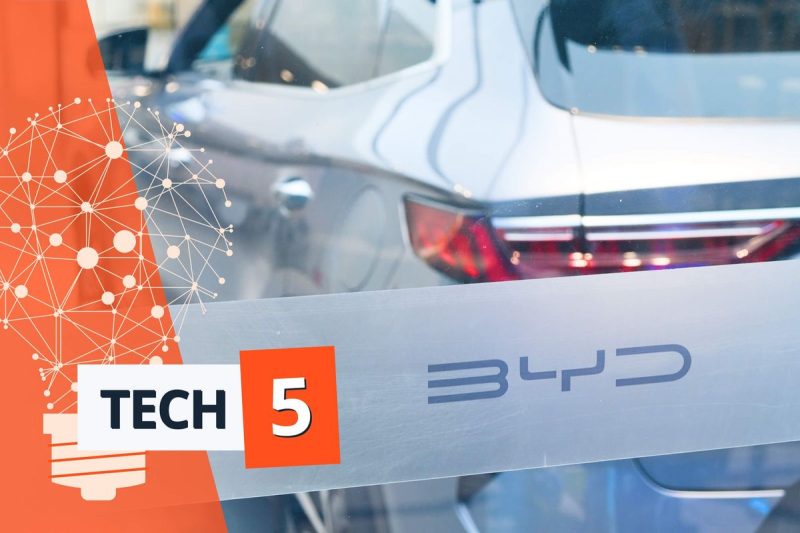
Tech 5: BYD Set to Beat Tesla in EV Sales, New York Times Sues OpenAI
The New York Times (NYT) (NYSE:NYT) has filed a lawsuit against OpenAI, the maker of generative artificial intelligence (AI) platform ChatGPT, alleging copyright infringement and intellectual property theft.
Meanwhile, an electric vehicle (EV) manufacturer in China could give Elon Musk’s Tesla (NASDAQ:TSLA) a run for its money, and a fintech company has made a comeback. Keep reading for more of the tech world’s latest stories.
1. China’s BYD poised to overtake Tesla as world’s largest EV maker
In a major shakeup, Chinese car manufacturer BYD Company (OTC Pink:BYDDF,SZSE:002594) is poised to dethrone Tesla as the world’s largest EV producer. While BYD is less of a household name, the company has been producing EVs for over a decade. In 2008, it shifted to electric auto-making with the release of a plug-in hybrid EV, the F3DM. This early entry into EVs was backed by a US$230 million investment from Berkshire Hathaway (NYSE:BRK.A,NYSE:BRK.B).
Sales of BYD cars have been steadily rising since Q1 of this year, and the company has been debuting its vehicles around the world throughout 2023. Meanwhile, Tesla deliveries have been declining since Q2, and the company is currently dealing with recall demands from two US senators, just weeks after facing its largest recall of over 2 million Teslas. Bloomberg analysts project that BYD’s EV sales will likely surpass those of Tesla during Q4.
2. New York Times sues OpenAI, alleging copyright infringement
The NYT has filed a joint lawsuit against OpenAI and one of its biggest investors, Microsoft (NASDAQ:MSFT), alleging that the companies used the publication’s “uniquely valuable works” to train its explosively popular chatbot ChatGPT.
In a court filing, the NYT states that it is seeking “billions of dollars in statutory and actual damages” from OpenAI and Microsoft for using the publisher’s intellectual property to train its large language models (LLMs). It claims that the chatbot can recite NYT content verbatim, and that Microsoft and OpenAI acquired this content without consent. In its complaint, the publisher argues that LLMs threaten the credibility of journalists, and states that if the NYT and other similar outlets can’t produce and protect their work, “there will be a vacuum that no computer or AI can fill.”
3. Fintech company Affirm rose more than 400 percent in 2023
Affirm Holdings (NASDAQ:AFRM), a fintech company that provides a buy now, pay later (BNPL) service to consumers, has had a stellar year. On Wednesday (December 27), it made headlines following reports that its share price was up 430 percent during the period, beating out all other fintech institutions valued at US$5 billion or more.
The company has been on the road to recovery since last year, when its share price plummeted 90 percent as high interest rates caused shoppers to tighten their wallets. Now, with economists all but certain that central banks will start cutting rates in the new year, consumers are showing a renewed interest in shopping; Cyber Monday shoppers broke an e-commerce record this year, despite dismal Black Friday sales.
All of that has been good news for Affirm. After becoming the go-to BNPL solution for Amazon (NASDAQ:AMZN) shoppers, the company expanded its deal with the retail giant on November 2.
4. NVIDIA redesigns popular gaming chip to meet US export controls to China
NVIDIA (NASDAQ:NVDA) released a redesigned version of its highly acclaimed GeForce RTX 4090 D graphics card on Thursday (December 28) as it attempts to circumvent strict export restrictions imposed by the Biden administration. A spokesperson for the company told Reuters that NVIDIA worked closely with government officials to ensure that the new chip is fully compliant with export controls. The chip will be available to customers in China as of January.
The chip is the first NVIDIA has designed specifically for the Chinese market, although the company has made previous attempts to modify its designs to comply with export rules. In the past, NVIDIA’s A800 and H800 chips were created with similar modifications, but were ultimately blocked by the Biden administration’s export order.
5. Chinese startup could even the microchip playing field
A little-known Chinese tech startup called SEIDA is reportedly looking to offer an advanced microchip design tool, as reported by Reuters on Friday (December 29). SEIDA’s CEO is Liguo ‘Recoo’ Zhang, a former employee of a US unit of Germany’s Siemens (OTC Pink:SMAWF,ETR:SIE). According to information obtained by Reuters, Zhang returned to China after living in Silicon Valley and took control of the company in 2022.
So far, Zhang has managed to attract a great deal of investment attention, with notable amounts coming from an arm of China’s leading chipmaker, Semiconductor Manufacturing International (HKEX:0981), a company that is currently facing several US restrictions due to its alleged military ties. Semiconductor Manufacturing’s supplier, Applied Materials (NASDAQ:AMAT), is currently under US investigation for potentially violating export restrictions.
Securities Disclosure: I, Meagen Seatter, hold no direct investment interest in any company mentioned in this article.
